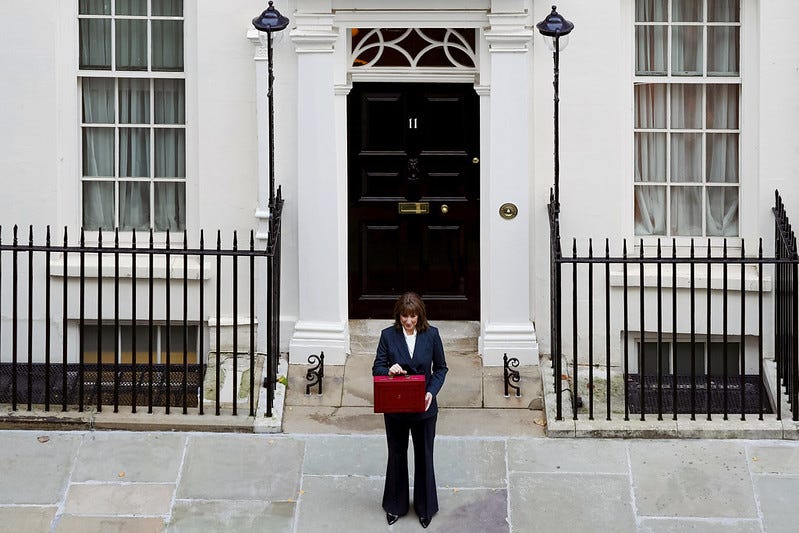The Chancellor has given up on growth
Growth is clearly no longer the government's top priority - if it ever was
Today the Chancellor raised the white flag in the battle for economic growth.
There were two key audiences for this budget for the Chancellor; the two who have the ability to hand her a P45. First, backbench Labour MPs. The same MPs that forced the u-turns on winter fuel and welfare reform. Second, the markets. If she had wobbled at all in her commitment to her fiscal rules things would have unraveled quite quickly.
She satisfied the first by lifting the two-child benefit cap and avoiding a rise in the headline rate of income tax. She satisfied the second by increasing the headroom she has against her fiscal rules. She paid for it all by hiking the tax burden to its highest ever through a dog’s dinner of damaging tax rises on working people and the businesses that drive growth.
I’m old enough to remember when this Chancellor was proudly claiming that economic growth was the number one priority of this government. Of ‘Plans for Change’ that had growth at their heart, and manifestos that pledged to stop at nothing to deliver the growth Britain desperately needs.
Surely then, when faced with a fiscal blackhole and a downturn in the productivity and growth forecasts, the Chancellor would double down and put the boosters on her plan for growth to turn the ship around? Apparently not. In the OBR’s words, ‘none of the policy measures in this Budget have a sufficiently material impact to justify adjusting our post-measures potential output forecast’. In layman’s terms: there is no plan for growth.
Reeves did her best to pin the blame on her predecessor’s and external forces for the grim outlook on growth – and she’s not entirely wrong to. The OBR has long been overly optimistic with their productivity forecasts, and previous governments imply have not done enough to move the dial. But has she forgotten who is at the wheel now?
She could, if she wanted to, do something about it. It clearly isn’t as easy as we would like it to be, but it’s not that hard either. When delivering the budget in 2024, the Chancellor gleefully pointed to the 0.2 percent growth that was added to the forecast because of the Government’s planning reforms. Has it crossed their mind that there might be further they can go on that front?
What about tax reform? This, after all, was the annual budget, the one major moment of the year to enact serious fiscal policy reform. We know that taxes, and the tax system, can have a serious impact on economic growth, so did the Treasury consider any real structural tax changes to at least point the economy in the right direction?
What about looking again at some of the more damaging measures that the Government themselves have implemented, and revisiting with a clearer pro-growth lens? The Employment Rights Bill and the Renters Rights Act would be good places to start. And though reversing their hikes on Employers National Insurance and Minimum Wage that have made hiring so expensive may be too much to hope for, is going even further on the latter really going to help drive growth?
The answer to all of these questions is evidently a firm ‘no’. Gone is the exciting, radical talk of being the government for growth. In its place, we have much more talk of ‘fairness’ and ‘bearing the burden’.
And the burden that needs baring is welfare and pension spending, yet more clear problems that the Chancellor failed to tackle. The welfare bill is going to be another £9bn higher by the end of this parliament thanks to the Government’s u-turn on their reforms, and the lifting of the two-child benefit cap. Meanwhile pension spending will continue to climb while the triple lock stays in place.
Who is going to pay for all of this? Before the election, the Government’s answer would have been ‘we will grow the economy’ to pay for it. But they have turned their back on that solutions, and instead reached into the pockets of the working people they claimed to protect, and the businesses that could drag us out of this mess. Where there was once a government that at least paid lip service to the need to grow the economic pie, we now have one focused only on divvying up what is left.




